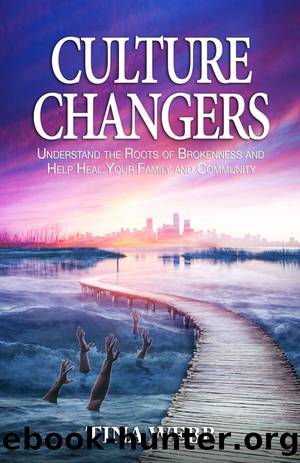Culture Changers by Tina Webb

Author:Tina Webb
Language: eng
Format: epub
Publisher: Carpenter's Son Publishing
Published: 2020-09-05T00:00:00+00:00
CHAPTER NINE
Repairing the Family
Call it a clan, call it a network, call it a tribe, call it a family: Whatever you call it, whoever you are, you need one.14
JANE HOWARD
Connection breeds life. This statement is more than just a biological truthâitâs one we can feel. We actually need to be connected to each other in healthy ways so we can prosper.
Connection, or lack thereof, becomes a part of a familyâs culture. That culture is also based on the attitudes, traditions, and worldview of the parents and guardians, plus emotional dispositions, inherited behaviors, racial background, and environment; all those things can affect the culture of a family. When a family fails to provide the connection that God intended, members look to fulfill those needs in other relationships. Friendship can offer a connection that is often more satisfying than oneâs own family relationships. As some say, âYou canât pick your family,â meaning that we often wish we could!
However, despite how rewarding friendships can be, Godâs intent is for the family to be our first healthy connection. Ironically, even though family dysfunction can permeate generations, a blood connection brings a profound sense of identity, where physical characteristics, talents, and history are the highlights. Nevertheless, any unmet emotional connection from our family of origin is a soul wound that needs to be healed.
Family systems are the building block of communities. Without family identity, we become a collection of individuals whose connectivity is based only on our humanityâa connection far too remote and expansive to appeal to our need for closeness, accessibility, and the ability to relate to shared experiences and daily living. We are wired to be known intimately. Every mother knows their child better than that child knows themselves during the developmental years. During adolescence, we become more aware of our innate emotional and physical longing for intimacy. Our sense of worth develops in an intimate setting. A familyâeven adopted family, offers a sense of home and a shared environment, even if it is a stressful one.
With the obvious importance of the family in mind, we can consider the divine purpose of the familyâitâs âfunction,â according to sociologists. The functions of a family are primarily âreproduction; socialization; care, protection, and emotional support; assignment of status; and regulation of sexual behavior through social norms.â15
Nowadaysâwith the intensifying conversation about societal paradigm shifts, racial divisiveness, economic class systems, divorce, and even gender politicsâmany people think about the family structure through a paradigm called the conflict perspective. This perspective views the family structure as a force that promotes male dominance and economic inequalities (due to inherited social status).16 Conflict theorists donât see the divine purpose in the family structureâthey believe it is simply a social construct.
So as Culture Changers, we need to analyze our view of the significance of the family. What does the family mean? Why does it exist? What is its divine purpose? However, we can answer these questions correctly only from a place of emotional healthânot emotional brokenness. Open wounds will skew our viewpoint. To one degree or another, all of us have experienced hurt within our homes.
Download
This site does not store any files on its server. We only index and link to content provided by other sites. Please contact the content providers to delete copyright contents if any and email us, we'll remove relevant links or contents immediately.
Fangirl by Rainbow Rowell(9227)
How to Bang a Billionaire by Alexis Hall(8144)
Wonder by R. J. Palacio(8097)
The Space Between by Michelle L. Teichman(6927)
The Thirst by Nesbo Jo(6922)
Assassin’s Fate by Robin Hobb(6197)
Wiseguy by Nicholas Pileggi(5766)
The Night Circus by Erin Morgenstern(5215)
Paper Towns by Green John(5175)
The Kite Runner by Khaled Hosseini(5162)
Bittersweet (True North #1) by Sarina Bowen(4842)
Gerald's Game by Stephen King(4638)
Too Much and Not the Mood by Durga Chew-Bose(4333)
Pillow Thoughts by Courtney Peppernell(4271)
Goodbye Paradise(3797)
Twelve Days of Christmas by Debbie Macomber(3559)
Good by S. Walden(3544)
The Rosie Effect by Graeme Simsion(3459)
The Cellar by Natasha Preston(3332)
